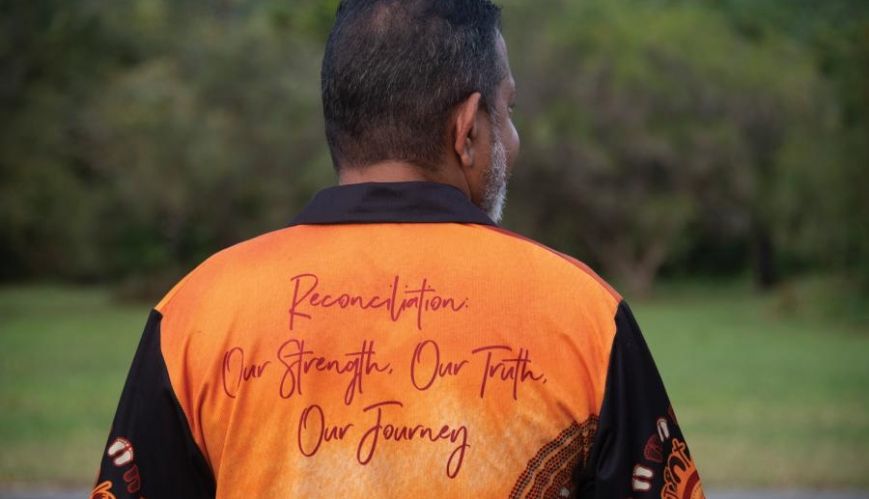Healing Country through greater understanding

Healing Country through greater understanding
5 July 2021
Christopher Congoo is the Aboriginal and Torres Strait Islander Engagement Coordinator for The Salvation Army.
Townsville-based Christopher Congoo is the Aboriginal and Torres Strait Islander Engagement Coordinator for The Salvation Army. Among many initiatives, Chris prepares ‘Kup Murris’ – traditional underground cooking for a feast – to share with his local Salvos faith and ‘recovery’ community members. Christopher sees it as one of many ways to encourage those of Aboriginal and Torres Strait Islander heritage to “be proud of who we are as a people, plus more widely share the importance of protecting and respecting Country and practices”.
The theme of NAIDOC Week is ‘Heal Country’.
‘Country’ is more than a place for Aboriginal and Torres Strait Islanders. It is an inheritance and a responsibility that has been passed down for thousands of years. The term is often used to describe family origins and associations with particular parts of Australia.
We identify ourselves with our Country through our Song Lines (boundaries) and our Moiety Groups. My Moiety Group is Widtaru. I am also a Senior Lawman for my mother’s country Giya/Ngaro, and my skin name is Guburu Gundulu (emu). This means I have responsibility for managing and protecting the emu and looking after my Country.
When I die, my son has the responsibility to care for that country. It’s his responsibility. When he dies, then his son stands up, and that’s how things are passed down.
For us, spirituality comes from the land, skies and waterways, and you have to look after everything that lives on that land, skies and waterways, because everything that comes from them, in turn, contributes to sustaining us.
Cultural care
I live and work in Townsville on Wulgurukaba Country and the lands of neighbouring clans.
My role is to support, train and provide guidance to Salvation Army expressions, ministry and enterprise, plus give advice nationally to policy-makers as a subject-matter expert to provide an Aboriginal and Torres Strait Islander perspective.
Our team is also undertaking the rollout of our national Aboriginal and Torres Strait Islander Cultural Competency and Capability Framework, which follows the launch of The Salvation Army Reconciliation Action Plan (RAP) late last year.
One thing I love to do with those associated with our local Salvation Army recovery service and church (corps) in Townsville is a Kup Murri.
In the preparation of cooking a Kup Murri, we take people out and show them what types of rocks and wood to gather because it’s not just any type of rock or wood that can be used. It also provides an opportunity to pinpoint materials that suit spears, clap sticks, boomerangs, trays, shields and different foods.
In the process, we only ever take what we need to ensure care for the environment and those who come after us; then, we return the area to its original state afterwards.
After we pull the food out of the ground and prepare it to serve, people often say, ‘this is the best food I’ve ever eaten’. We then have another opportunity to yarn, connect, feast, share our truth, and build deeper understanding and respect for age-old traditions, cultures, and history.
Vision
We don’t just live on Country. We are part of Country. It’s tied to our existence, spirituality, identity, culture, lore and language. It is the way God, our creator, made it and entrusted Aboriginal and Torres Strait Islander peoples the responsibility to protect and care for Country for the good of all who live and visit.
We also have a cultural responsibility we are entrusted with to care for the land we identify with through our kinship systems and make others aware of that responsibility. This can cause angst for non-Indigenous peoples because our perceptions or understanding of caring for Country/land or ownership differ.
Imagine this for a moment: our people have lived on this Country for a long time. They used plants, animals and other natural materials from their environment, showing a distinct relationship to Country. Our creator God provided the resources to survive and meet our basic human needs, such as food, shelter, clothing and medicines. We were also able to create tools, weapons, art, craft and ceremonial objects.
Each of you in The Salvation Army has an opportunity to listen, to learn or unlearn and on our relationships with Aboriginal and Torres Strait Islander peoples. You can be intentional about learning more about our people and our connection to the land, and the impacts of colonisation.
We can come together with modern knowledge and cultural knowledge to heal or begin afresh with restoring relationships and Country. This is the time to do some independent research and engage with your local Aboriginal and Torres Strait Islander peoples to deepen your understanding of our shared history and a different perspective of the Country you live, work, and play in.